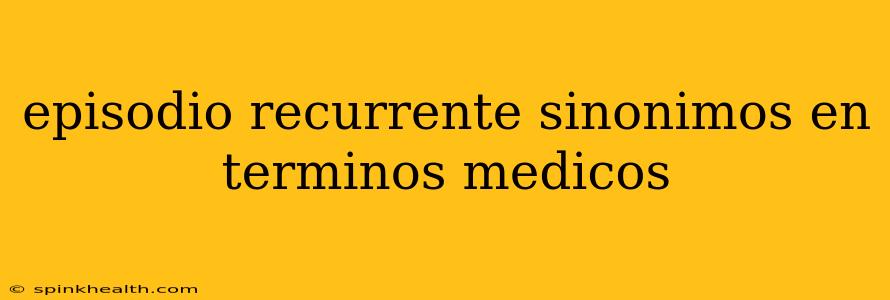Episodio Recurrente: Sinónimos en Términos Médicos y su Significado
The phrase "episodio recurrente" in a medical context refers to the repeated occurrence of a symptom, sign, or event related to a specific disease or condition. Understanding the nuances of this term is crucial for both medical professionals and patients. Let's delve into its meaning and explore synonymous medical terms, clarifying their subtle differences.
This isn't just about finding synonyms; it's about understanding the underlying clinical implications of recurrent events. Each term carries a specific weight, hinting at the nature and severity of the condition.
What Exactly Does "Episodio Recurrente" Mean in Medicine?
Imagine a patient with migraines. "Episodio recurrente" in this case would describe the repeated instances of migraine attacks. The key here is the repetition and the association with a particular medical issue. It's not just about any symptom happening again; it's about a specific, identifiable event reappearing within the context of a diagnosis.
This distinction is crucial. A headache returning once might not be considered a "recurrent episode," but repeated episodes of similar headaches, indicative of migraine, would be.
Synonyms and Related Terms
Several terms in medical terminology convey a similar meaning to "episodio recurrente," each with subtle variations in emphasis:
1. Recidiva: This term specifically points to a return of a disease after a period of remission or apparent cure. A "recidiva" implies a resurgence of the disease itself, not just a recurring symptom. For example, a cancer patient experiencing a recurrence of their cancer after treatment would be described as experiencing a "recidiva."
2. Reincidencia: Similar to recidiva, but often used in the context of infectious diseases or behavioral patterns. It emphasizes the repetition of an infection or a harmful behavior. For instance, a patient experiencing repeated infections with the same pathogen would have experienced reincidencia.
3. Exacerbación: This term describes a worsening or intensification of an existing condition. While it may involve recurring symptoms, the focus is on the increase in severity, rather than simply the repetition of the episode. An asthmatic patient experiencing a sudden worsening of their breathing would be experiencing an exacerbation.
4. Reaparición: This is a general term referring to the reappearance of a symptom or sign. It's broader than "recidiva" or "reincidencia" and doesn't necessarily imply a complete remission before the reappearance. A patient experiencing the return of a rash after treatment could be said to have experienced a reappearance.
5. Ataque recurrente (or Paroxismo recurrente): This term is particularly suited for conditions characterized by sudden, intense episodes. The use of "ataque" or "paroxismo" emphasizes the acute and intense nature of the recurrent event. For example, recurrent seizures would be referred to as "ataques recurrentes."
6. Episodios recurrentes de... (followed by the specific condition): This is a direct and descriptive phrase, clarifying the recurring event directly. For example, "episodios recurrentes de depresión" is a clear and precise medical description.
The choice of term depends heavily on the specific clinical context. A precise and appropriate term is essential for accurate medical records and communication. Understanding these differences allows for a more comprehensive understanding of medical reports and conversations.

